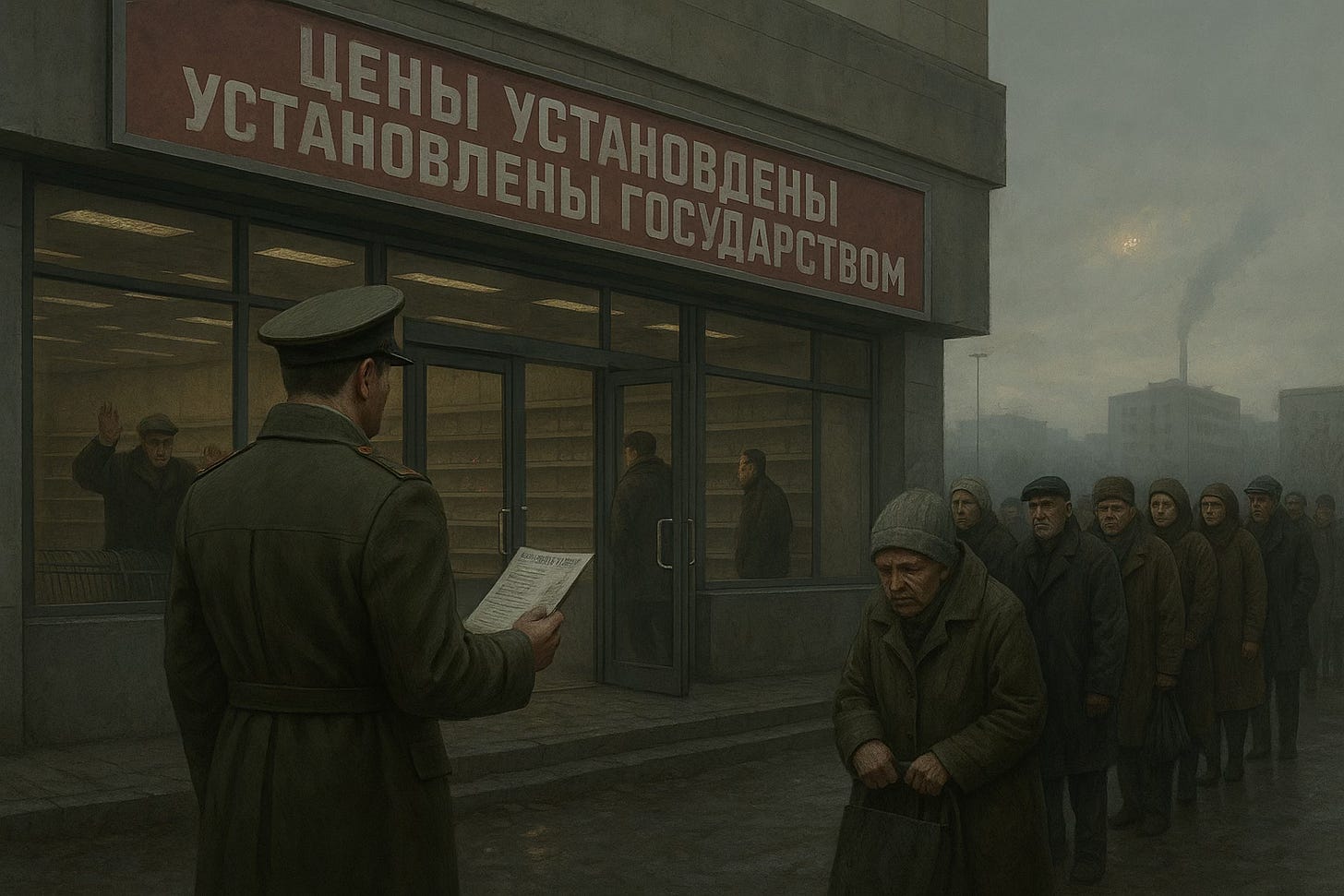Putin vs. Potatoes
Russia’s New Economic Plan Begins With Potatoes, but It Could End in Chaos
March 1, 2026. Remember that date.
That’s when Russia implements state-mandated prices for potatoes, milk, eggs, sunflower oil, carrots, tomatoes, onions, apples, and sugar. Fixed prices. Court orders required to break contracts. By 2028, ninety percent of food production gets routed through this machinery.
Potatoes up 90% year-over-year. Butter climbed 30%. Central Bank rates hit 21% before sliding to 18% in July. But here’s what matters: 58% of Russians now worry about prices more than anything else. The war? Only 33% care.
Food doesn’t give a damn about your five-year plan. Weather happens. Diesel costs what it costs. Fertilizer prices don’t respond to Moscow’s wishes. Russia imports the equipment, pesticides, and seeds that make modern agriculture work. When you cap output prices while input costs explode, you get one thing.
Empty shelves.
Oleksandr Talavera nailed it: “The moment the state says it will regulate prices, that product disappears.”
The meat producers already see disaster coming. Sergei Yushin warns operations might just… stop. X5 Group, which runs the big retail chains, tries diplomacy: “existing contracts work fine.” Even Kommersant admits producers are plotting workarounds for rules that don’t exist yet.
Right now contracts cover 60% of potatoes, 75% of eggs. They want 80% by next year, then 85%, then 90%.
Communist Party still holds 11–12% of Duma seats. Guess that’s enough to drag everyone back to the bad old days. Except there’s no Gorbachev waiting to save them this time.
Price discovery is information processing. Billions of decisions creating signals. Moscow wants to replace that with bureaucrats. Won’t work.
The draft law gets specific. Annual renegotiation allowed, but breaking contracts needs a judge. Courts deciding if dairy farmers can stop losing money. The judiciary running agriculture.
Seven months until this kicks in. Smart money’s already moving. Producers liquidating. Gray markets forming. Anyone with sense buying canned goods. Markets clear one way or another – Moscow just gets to choose if it’s legal or not.
Alexander Kolyandr floats the idea this buys political breathing room. Maybe for a few months.
Think about who’s running this show. Same crew that can’t get working boots to soldiers. Same bureaucracy where thirty percent of everything vanishes into someone’s pocket. Same system needing three signatures for pencil requisitions. These guys are gonna optimize national food distribution across eleven time zones?
Even the machines see it coming. Run this through any model – AI, economic, whatever – same answer pops out: shortages. When silicon reaches the same conclusion as every economist who lived through the ’80s… well.
Russia tasted markets. Not perfect, but functional. They knew what worked and chose amnesia. This isn’t ignorance. It’s deliberate. They’re following a plan that happens to be insane.
Interest at 18%. Inflation around 10%. Foreign assets frozen. Workers getting mobilized instead of harvesting. And now this.
Ekaterina Schulmann gets the timing: things break when goods vanish AND paychecks stop. Not decline – full stop. That’s when physics beats politics.
The Romanovs learned about food prices the hard way in 1917. Maria Snegovaya at CSIS sees the parallel everyone’s thinking: empty stomachs make revolutions. Apparently the Kremlin skipped that history class.
Last time Russia tried this, took seventy years to fully collapse. But that was in isolation. Now? Global markets watching. Information leaking despite censorship. People who remember when stores had food.
It might be faster this time.
The parallel’s obvious. Soviet Union collapsed fighting in Afghanistan while the economy crumbled. Now it’s Ukraine and the same economic mistakes.
March 1, 2026.
That’s when Russians find out if they remember how to queue. When empty stores become the norm again.


